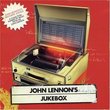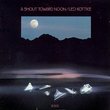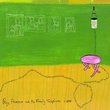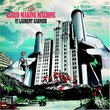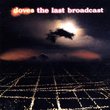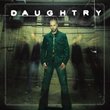| All Artists: Juana Molina Title: Son Members Wishing: 0 Total Copies: 0 Label: Domino Original Release Date: 1/1/2006 Re-Release Date: 9/18/2006 Genres: Alternative Rock, International Music, Pop, Rock, Latin Music Styles: Indie & Lo-Fi, South & Central America, Argentina, Reggae, Latin Pop Number of Discs: 1 SwapaCD Credits: 1 UPCs: 5034202017622, 801390009426, 5034202017615, 5034202017653, 5099950578955 |
Search - Juana Molina :: Son
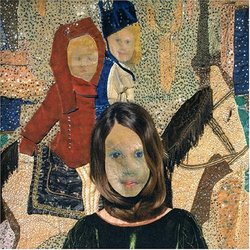 | Juana Molina Son Genres: Alternative Rock, International Music, Pop, Rock, Latin Music
Argentinean singer Molina was introduced to the American public with the release of her second album, "Segundo". A mixture of acoustic guitars, traditional percussion touches, electronic textures, and her disarming vocals ... more » |
Larger Image |
CD DetailsSynopsis
Album Description Argentinean singer Molina was introduced to the American public with the release of her second album, "Segundo". A mixture of acoustic guitars, traditional percussion touches, electronic textures, and her disarming vocals make it one of the most evocative and original albums in recent memory. NPR's "All Things Considered" praised her, as did Entertainment Weekly when it named "Segundo" "Best World Music Album of 2003". "Sounds like Stereolab's Laetitia Sadier covering Nick Drake, whispering luminous folk tunes amid electronic thickets while acoustic guitars and pianos flicker like votive candles" ¿ Entertainment Weekly. 2004's follow-up, "Tres Cosas" was equally revered, as Jon Pareles of the NY Times named it a top ten record of the year, and it won even more fans as diverse as Savath & Savalas, David Byrne, Belle And Sebastian, and Sam Prekop. This is her first new material in over two years and is the first of her albums to be released simultaneously around the world, which should heighten the album's impact. Similar CDs
Similarly Requested CDs
|
CD ReviewsThe Very Best Album of 2006 Dan Mohr | Lynnwood, WA, USA | 06/06/2006 (5 out of 5 stars) "How to describe Juana Molina's incomparable music? Perhaps a recollection of some direct personal experience would be the closest thing to adequate. I saw Molina play at the Walker Art Center in Minneapolis last year, and it was an extraordinary evening: there she was, onstage entirely by herself with her guitar and keyboard sampler, and as she proceeded to play her indescribably gorgeous ambient-folk songs, her brilliant technique of weaving `electronic musical tapestries' slowly unfolded - she would play a basic sequence, sample it, then have the sampler repeat it over and over again, and continue to play and sample her playing, until it literally sounded as if there were ten Juanas in the concert hall, all playing different yet equally beautiful musical accompaniments to her primary melodies. It was nothing short of breathtaking to be in the company of such musical imagination and prowess, almost like witnessing the musical variation of a gold-medal-winning ice skater's or gymnast's routine at the Olympics. Such musical delicacy, yet such strength and confidence were on display that it left me thinking, A. "my god, how does she do it!?" and B. "I wonder what it must feel like to create and play music that is *that* original and beautiful." Among fellow female musicians who compose with electronics, Molina's music shares a general similarity with that of Bjork and Solex (aka Elisabeth Esselink). Unfortunately my ability to enjoy Bjork's music has disappeared as her artistic tendencies in recent years have drifted towards musical extremes along the lines of Lou Reed's infamously unlistenable `Metal Machine Music.' As for Solex, Esselink, like Molina, has also created a brilliant electronic-music landscape entirely of her own making. But Esselink samples previously-heard `found sounds' charmingly and ironically, with an emphasis on knowing, mischevious humor and an indie pop-rock sensibility; while Molina instead focuses on sounds found in nature - birds, catcalls, the wind in trees, and her song structures are much more poetically amorphous. Solex might be the hip, ironic, metropolitan big-city musician sister to Molina's paradisial nature lover. It's an important distinction, because it seems to me that Molina places no emphasis whatsoever on "hipness" in her music - her music is so organic and timeless that any sense of trendiness or fashion is inapplicable and unnecessary concerning her artistic intentions. Molina's music is as "pure" in its creation and performance as any contemporary music ever made, and it would be a serious mistake to lop her in with the many hopelessly inferior and mediocre light-alt pop-folk singers/songwriters now cluttering up contemporary mainstream airwaves and in heavy video rotation on VH1. For those not previously acquainted with Molina's history, a short summary: Molina was for years Argentina's most beloved TV comedienne - she wrote and starred in her own musical-comedy series entitled 'Juana and Her Sisters,' until she decided to forgo her career in television to pursue her creative muse in music. It was an obviously very brave decision, and for Molina - and us the listening audience - the decision was invaluable. Molina's very first album, Rara (1996), was (as to be expected) maligned on release as a standard celeb-ego foray and is still widely looked back as being her initial creative concession to the musical mainstream; while it lacks the stunning creative vision of her ensuing music, it's actually a very enjoyable piece of straightforward folk-rock. Perhaps it was useful as career-therapy, because afterwards Molina took an extended break, re-examined her artistic sensibilities, then went back into the studio, and nothing could have prepared us for what was to follow. Not counting her unofficially-released collaboration with musical colleague Alejandro Franov (the CDs of which were independently distributed only on her 2005 tour), Son is Molina's first album of brand new material in four years. (I exchanged e-mail with Juana last year and she informed me that the release dates of 2003 and 2004 on her previous two albums, Segundo and Tres Cosas, were from Domino Records; they were in fact recorded in 2000 and 2002.) Like those two previous albums, Son is a masterpiece, and it is also a natural evolution into the next phase of Molina's development as an artist. Whereas Segundo could be viewed (reductionistically, to be sure) as Molina's pop album, and Tres Cosas her folk album, this new LP is her most experimental - it may be off-putting upon initial listens, but the more you listen to it, the more it draws you into its absolutely brilliant musical web. Molina recently remarked how her favorite album of the past few years was the experimental folk-rock band Animal Collective's Sung Tongs, because it was (in her words) "so free and unique." She has taken that appreciation and turned it into her primary inspiration for Son. `Rio Seco' casts its hypnotic spell on contact, drawing you in immediately with Molina's yearning vocals and astonishingly arresting melody; it's the most powerful and enthralling opening number of any of her albums. Next up, `Yo No' is one of Son's great curveballs, and sets the stage for what Molina's strategies for this record are - to take her magnificent acoustic melodies and twist and twine them into initially confounding yet ultimately rewarding forms. `La Verdad' returns to a slightly more conventional yet equally beauteous acoustic hymn, with the song ending on a delightful chanting sing-song refrain. `Un Beso Llega' is the sister song to `El Perro' from Segundo - only where that earlier tale about a dog barking outside Molina's window utilized samples of an actual dog's yipping, here the lovely melody literally collapses midway through into a cacophany of cats' meowing - which, by all appearances, seems to be Molina herself doing the meowing! (Granted, in concert she graciously provided the dog's, er, vocals for `El Perro' as well.) `Micael,' the only cover song on the album, may seem initially the most conventional song on the record, and offers the biggest surprise. At first its formal and stoic musical traditionalism may have you wondering, "what in the world is this song doing on *this* record?" But halfway through, Molina gleefully explodes the song's structure from the inside-out, giving us chant-calls, light gongs and chimes, and almost jazzy scat-singing vocal improvisations - so what originally seemed the most obvious tune on the album turns out to be the most audacious - and, of course, one of the most enjoyable. The song `Son' is a gentle and mysterious ambient meditation, perhaps written to Molina's own children. `Malherido' extends Molina's reach into a possibly new musical genre - ambient hip-hop. Over gorgeous electronic pattering, Molina gives us what might be her own self-styled Latin-American rap, but her vocal delivery is beautifully understated, and couldn't be further from Def Jam if she tried. (This album's musical landscapes are so strong and beautiful that it can even withstand a minor digression like `Las Culpas,' where Molina does a toned-down impression of a demonic Diamanda Galas, processing her voice to sound like a hundreds-of-years-old rainforest witch delivering incantations and casting spells.) As if to reassure us that she hasn't completely abandoned her much-beloved ambient-folk stylings, Molina provides a pair of sublime acoustic ballads, `Desordenado' and `Elena'. The album closes with `Hay Que Ver Si Voy' (translated to "it is necessary to see if I go"), an epic eight-minute acoustic anthem that ranks with Molina's finest compositions. Although I admittedly don't understand 99% of Molina's lyrics, as nearly all of them on her albums are in Spanish, the beauty and charm of Molina's entirely unaffected vocals carries you over your incomprehension; like listening to the best of Astrud Gilberto or Elis Regina or Serge Gainsbourg and Jane Birkin, you need not understand what the lyrics are about in order to be completely swept away by the music. I may not have a clue what the lyrics in `Hay Que Ver Si Voy' actually mean, but when I listen to Molina's melodies and vocals I hear and feel Molina expressing her strength, resolve, happiness, love of life, the experience of a life fully lived and optimism in the future. Of course it would be wonderful to be fluent in Spanish, but as far as Molina's (and Gilberto's, etc.) music is concerned, I don't think I'm missing very much. Juana Molina is in the same rarefied musical company as Radiohead, the little-known band Akron/Family (Young God Records) and Tom Jenkinson (aka Squarepusher) - contemporary pop musicians whose commitment to their musical vision is absolute, and whose musical virtuosity is aesthetically transcendent. Their musical vision goes beyond the glorious craftsmanship of a Nick Cave or PJ Harvey or Jack White or Holly Golightly or Rufus Wainwright or Madeleine Peyroux, modern-day music which draws upon the very best of older forms and traditions to produce marvelous new versions of the classics. Molina and her peers follow their supremely original artistic muses wherever they will, and we as listeners are only too lucky to be invited along on that voyage of musical discovery. For me, Molina is at the head of the pack, and her latest album only confirms my feelings. While Radiohead, Akron/Family and Jenkinson are masters of musical tension and drama, Molina has moved even beyond that realm of artistic creation into a musical universe completely of her own devising. In "Imagine," John Lennon sang of a hypothetically benevolent and tranquil world at peace with itself. Molina has taken it upon herself to create her music entirely from that aesthetically utopian space - playful, experimental, lyrical, ethereal, elegiac, passionate, inviting and welcoming - in short, utterly rapturous - the often hushed and whispered sounds of which have truly left a larger and louder impact on my soul than any other contemporary music I've ever heard - period. Her recordings are a blessed antidote to the blunt bombast and assault of so much contemporary music, and, let's face it, modern-day life. The refinement and subtlety of Molina's extraordinary musical talents make you lean closer to your stereo to hear more of what she has to offer. [...]" The most intense dream yet Todd Boostrom | Pacific Palisades, CA United States | 06/08/2006 (5 out of 5 stars) "All of Juana Molina's albums are excellent, but this is my favorite. Her sound is there, connecting strongly with her earlier work, but there's more confident experimentalism at the edges, giving a fuller sound. The first song, "Rio Seco", has an Ennio Morricone-style guitar lick with her vocal delivery a bit more intense than I've heard from her before. The next track, "Yo No", begins in a familiar vein, but uses sound samples beautifully to push the song into interesting territory. Another highlight for me is "Un Beso Llega", using keyboards and sounds similar to her earlier work, but in the forefront, not the background, showing what was always there can do more given the chance. "Micael" begins with her beautiful vocals and guitar, but like the other tracks, doesn't stop there. The track "Son" is a slow, meditative track, using silence well. "Hay Que Ver Si Hoy" builds to a nice sampling of Molina's voice. Like the visuals of the gorgeous CD cover this album comes in, "Son" is intricately textured together, making a varied but cohesive whole. I bet this album played backwards has hidden messages about Jorge Luis Borges being in the Revolver-era Beatles :)" Juana's Most Mysterious Juan Mobili | Valley Cottage, NY USA | 06/24/2006 (5 out of 5 stars) "Juana Molina has been putting quiet Folktronica jewels for a while now. Not renouncing her Argentinean moods, Molina chooses here to explore wilder shores of Folk, somewhat reminiscent of Animal Collective, or Devendra Banhart in subdued moments.
The atmospheres, although spare sonically, are still dense. Whispered rather than sung, these songs will seep into your body and, in some cases, even transport you." |

 Track Listings (12) - Disc #1
Track Listings (12) - Disc #1